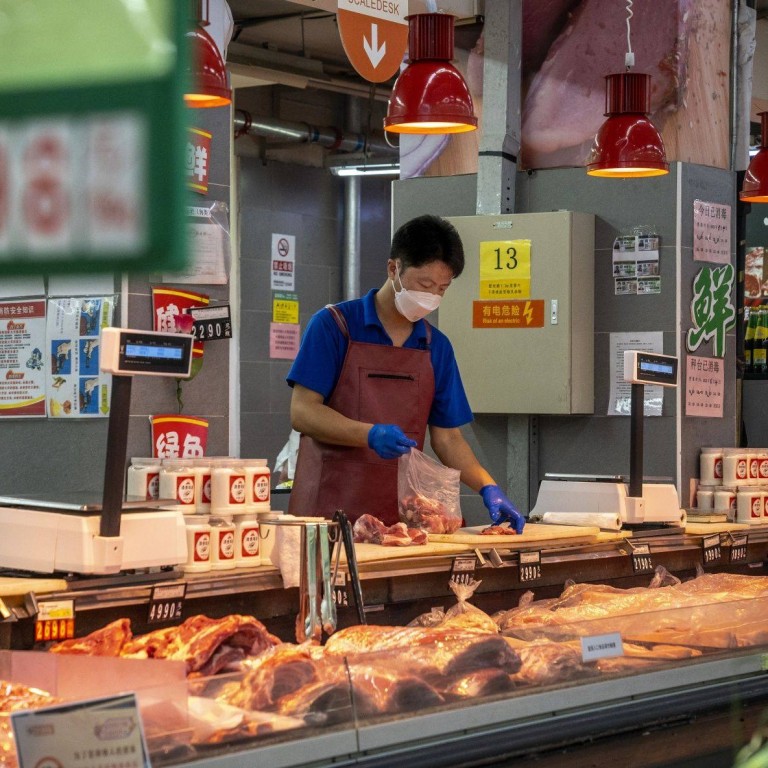
China inflation: consumer prices ‘close to a peak, will drop back’ despite hitting highest level in 2 years in July
- China’s consumer price (CPI) index rose by 2.7 per cent in July from a year earlier, up from a rise of 2.5 per cent in June
- Producer price index (PPI), which reflects the prices that factories charge wholesalers for products, rose by 4.2 per cent in July, down from a rise of 6.1 per cent in June
Despite hitting its highest level in two years last month, China’s consumer inflation is unlikely to breach the government’s target as stabilising pork prices and still-depressed growth momentum suggest limited further growth potential, analysts said.
The producer price index (PPI), which reflects the prices that factories charge wholesalers for products, also fell short of expectations after slowing for the ninth consecutive month to 4.2 per cent growth in July year on year, down from a rise of 6.1 per cent in June.
That is still very low by global standards, and we think headline inflation is close to a peak and will drop back over the coming quarters
“We think factory gate inflation will remain on a downward trajectory throughout the rest of the year amid a further drop in commodity prices, easing supply bottlenecks and a higher base for comparison,” said Huang Zichun, China economist at Capital Economics.
“Meanwhile, we doubt consumer price inflation will rise much higher. Admittedly, core inflation is likely to edge up as the labour market continues to recover from the Omicron wave. But we think this will be offset by a drop back in food and energy inflation.
“Consumer price inflation rose to a 24-month high in July and is now nearing the government’s target of 3 per cent. But that is still very low by global standards, and we think headline inflation is close to a peak and will drop back over the coming quarters.”
Food prices in China rose by 6.3 per cent from a year earlier in July, compared to 2.9 per cent in June, while non-food prices grew by 1.9 per cent last month, year on year, down from a reading of 2.5 per cent growth in June.
China’s consumer price index (2022)
| Date | Year-on-year change |
|---|---|
| 01/2022 | 0.9% |
| 02/2022 | 0.9% |
| 03/2022 | 1.5% |
| 04/2022 | 2.1% |
| 05/2022 | 2.1% |
| 06/2022 | 2.5% |
| 07/2022 | 2.7% |
Source: National Bureau of Statistics
The rise in food prices was driven by a 20.2 per cent increase in the price of pork in July year on year compared with a fall of 6 per cent in June, while the price of fresh vegetables rose by 12.9 per cent from 3.7 per cent growth a month earlier.
China’s core consumer inflation rate, excluding the volatile prices of food and energy, rose by 0.8 per cent in July compared with a year earlier, down from 1 per cent growth in June.
China’s CPI will rise by 2.8 per cent year on year in August and peak at “slightly above” 3 per cent in September, while PPI inflation will continue its downtrend over the next few months, according to Nomura analysts led by Lu Ting.
“We do not see rising CPI inflation as a constraint to Beijing maintaining its pro-growth policy stance, as core CPI inflation remains subdued.
“Falling PPI inflation also points to limited potential upside to CPI inflation.”
“CPI only rose marginally, less than the market expected. The market expected a faster pace of CPI inflation in July because food prices such as pork and vegetables rose sharply in July, and such prices can be observed on a daily basis,” said Zhang Zhiwei, chief economist at Pinpoint Asset Management.
“But non-food prices actually declined in July from their June level, which reflects weak domestic demand.
“This is consistent with the weak PMI data. The Covid outbreaks in many cities and the lack of further policy stimulus may have led to weaker growth in July.”

